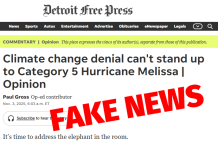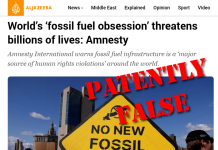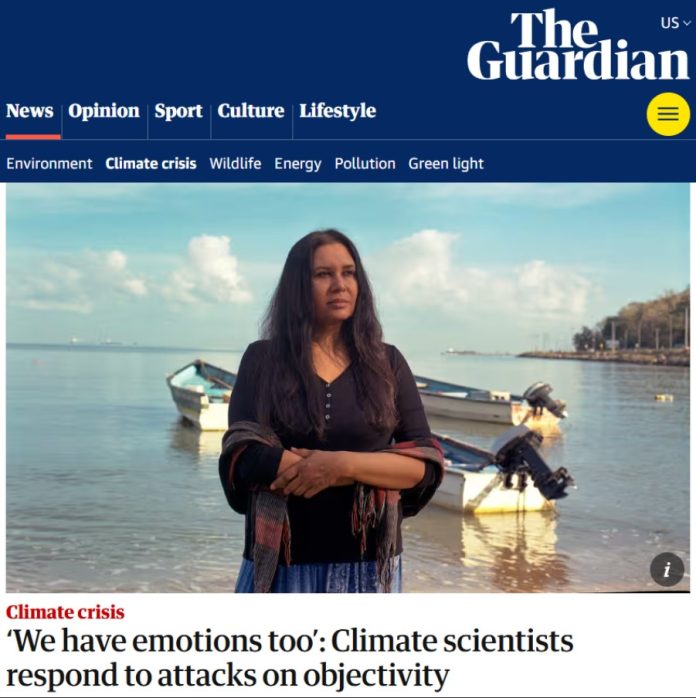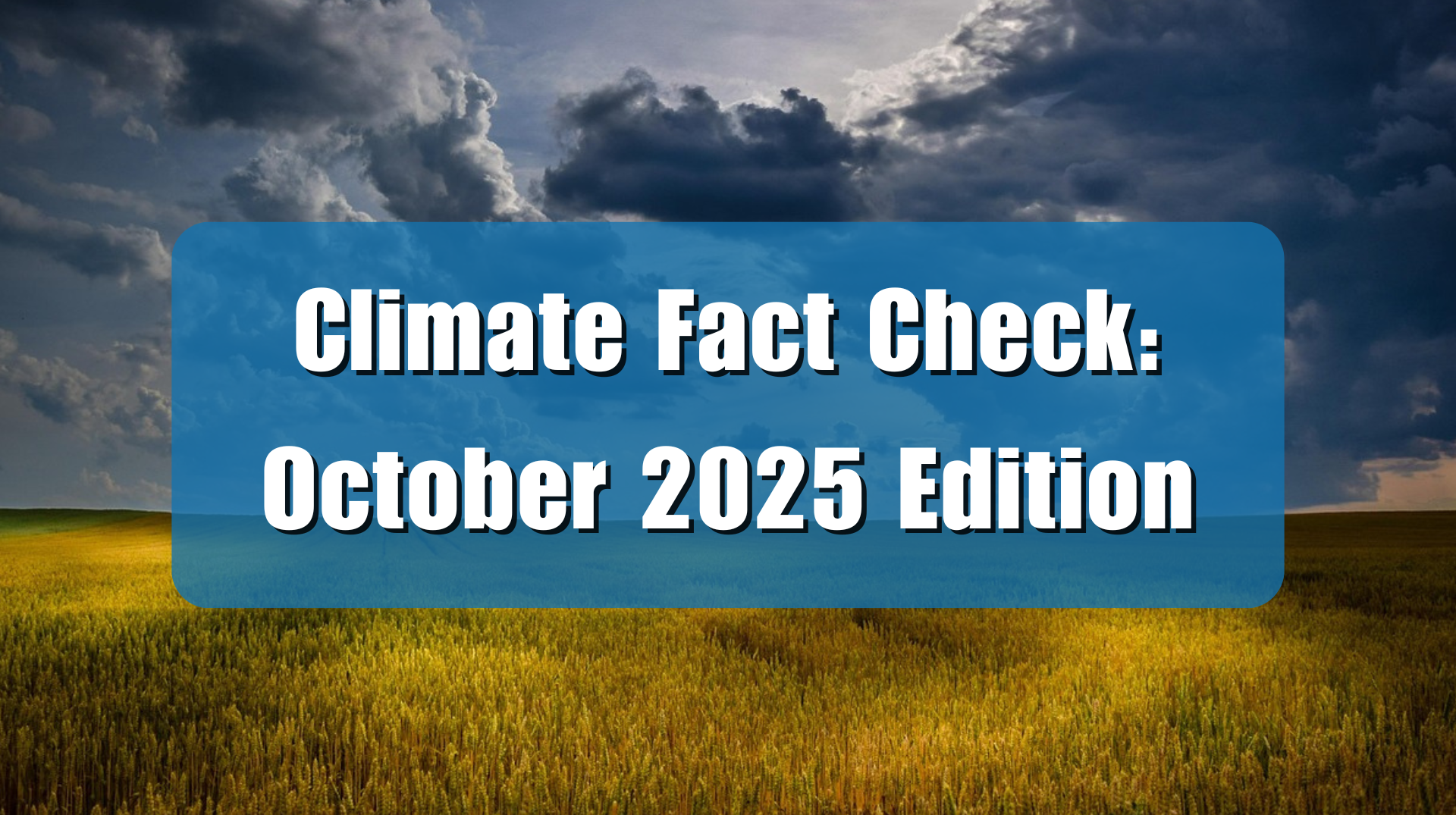Guest essay by Charles Rotter, originally published on WattsUpWithThat
These self-appointed climate saviors insist that their projections should be accepted without question, and when they aren’t, they moan about how harsh and unfair the world has been to them. This isn’t science under attack—it’s fragile egos crying foul when the rest of us refuse to buy into their doomsday narrative.
From the article:
The researchers said they had been subject to ridicule by some scientists after taking part in a large Guardian survey of experts in May, during which they and many others expressed their feelings of extreme fear about future temperature rises and the world’s failure to take sufficient action. They said they had been told they were not qualified to take part in this broad discussion of the climate crisis, were spreading doom and were not impartial.
However, the researchers said that embracing their emotions was necessary to do good science and was a spur to working towards better ways of tackling the climate crisis and the rapidly increasing damage being done to the world. They also said that those dismissing their fears as doom-laden and alarmist were speaking frequently from a position of privilege in western countries, with little direct experience of the effects of the climate crisis.
The Real “Crisis”: Hurt Feelings
The Guardian piece is full of climate scientists’ complaints about being criticized, a situation that apparently causes them great distress. They whimper about public skepticism as though it were some kind of assault on their personal well-being. In one particularly melodramatic section, a scientist whines about being called a “liar” on social media. Well, welcome to the world of public debate, where people will scrutinize, question, and yes, sometimes rudely dismiss claims that seem dubious. But the Guardian seems determined to present these professionals not as robust researchers capable of handling criticism, but as delicate flowers wilting under the harsh glare of public doubt.
Instead of addressing substantive criticisms—like the failed climate models, inconsistent predictions, or the fact that climate policies often do more harm than good—these scientists turn to emotional appeals. They argue that the public’s harsh words are as much of a threat as climate change itself. They even suggest that “climate anxiety” is exacerbated by “online abuse” from skeptics. So, let’s get this straight: the models can handle the complex calculations of global warming trends, but the scientists can’t handle mean tweets?
The “Toxicity” of Skepticism
One theme that dominates The Guardian article is the scientists’ characterization of public scrutiny as “toxic”. It’s a clever rhetorical strategy, designed to make criticism seem not only misguided but morally wrong. By framing dissenters as aggressors who “harm” scientists, the article tries to flip the script: suddenly, it’s not about whether the climate models hold up under scrutiny; it’s about whether the critics are hurting the scientists’ feelings.
If anything, this rhetoric exposes the scientists’ shaky confidence in their own predictions. People who are confident in their data don’t crumble under questioning. They engage, clarify, and persuade. But here, instead of rolling out hard evidence to silence their critics, climate scientists want sympathy. It’s a deeply unserious approach to a field that supposedly determines the fate of our planet.
Ben Pile’s critique in the Daily Sceptic nailed it when he observed that the current trend among climate scientists is to brand skeptics as not just wrong, but dangerous. By shifting the focus to the alleged “toxicity” of criticism, the scientists evade the actual issues—like why their models frequently overshoot reality, or why predictions of imminent catastrophe keep getting delayed like a badly managed train schedule. He Writes:
I believe that is the implication of Carrington’s series of Guardian articles and his survey. It shows that people with no scientific expertise to speak of are nonetheless routinely presented as ‘scientists’ and experts. It shows that even those with scientific expertise will happily and radically depart from both the consensus position and the objective data on both meteorological events and their societal impacts. And it shows they have no reluctance to use their own emotional distress as leverage to coerce others. Carrington thinks that showing us scientists’ emotional troubles will convince us to share their anxiety. But all it shows is that it would be deeply foolish to defer to the authority of climate science. It’s an unstable mess. Science must be cool, calm, rational, detached and disinterested, or it is just a silly soap opera.
Victimhood as a Shield
A whole tantrum (see murder of crows, pod of whales), of climate whiners scurried off to their ideological shelter, Nature Climate Change, to cry for help. You see, when public skepticism became too much for their fragile nerves to handle, this tantrum ran straight to “daddy,” hoping for a pat on the back and a warm bottle of validation. And what better place than Nature, a publication that will bend over backwards to prop up their emotional narratives? These scientists clearly needed a safe space where their feelings could be stroked, rather than questioned. Forget rigorous defense of their models and theories—no, no, this time it was about defending their delicate psyches from the big, bad skeptics on Twitter.
The Nature article isn’t just a plea for public sympathy; it’s a full-on temper tantrum disguised as scholarly commentary. The authors aren’t interested in hard science or debate—they want therapy. With a straight face, they argue that public criticism is akin to abuse, reducing scientific discourse to a matter of emotional resilience. So rather than refining their models, this tantrum of whiners wants the rest of us to accept that hurt feelings are a legitimate basis for climate policy.
The Nature article doubles down on this victimhood narrative, describing scientists as burdened not only by the existential threat of climate change but by the hostility of the public. The authors make a point of equating climate research with front-line war reporting, as if posting dire projections on X were the same as dodging bullets. This is a transparent attempt to invoke sympathy and sidestep criticism. If the scientists can present themselves as victims of a cruel public, then their arguments become untouchable.
The Guardian piece further amplifies this theme, portraying scientists as misunderstood martyrs who bear the emotional weight of foreseeing a bleak future. It’s as if being skeptical of poorly substantiated projections makes one a tormentor of noble truth-seekers. The narrative is clear: “Don’t question us, or you’re part of the problem.” But when scientific discourse devolves into moral posturing, it loses its credibility and begins to resemble a political campaign—one driven by emotional manipulation rather than evidence.
Social Media Tears
Of course, no article about scientists’ suffering would be complete without a good dose of social media victimhood. The Guardian article features complaints about online “abuse,” as scientists recount harrowing experiences of being criticized on platforms like X. According to these supposedly hard-nosed researchers, the online world is a mean place where people say unkind things about their predictions.
This is almost comical. After all, social media is a battleground for ideas, not a safe space for pampered experts. If scientists can’t handle criticism on X, how can they expect to withstand the scrutiny of peer review or public debate? Ben Pile rightly points out that climate scientists’ complaints about social media “abuse” often serve as an excuse to shut down dissent altogether. Rather than engaging with criticism, these scientists prefer to play the victim, using their emotional wounds as a shield against legitimate questions.
“Science” as a Moral Crusade
The Guardian article’s melodramatic tone is matched by its moralistic language. It tries to turn science into a crusade, with climate scientists cast as righteous warriors battling the forces of ignorance and denial. This framing isn’t just patronizing; it’s manipulative. By presenting climate scientists as virtuous crusaders, the article implies that their opponents are not just mistaken, but immoral.
The scientists even manage to make their emotions seem like a badge of honor, arguing that their despair over climate change somehow legitimizes their work. But in reality, emotional outbursts and moral grandstanding are signs of weakness, not strength. Scientists are supposed to be objective and dispassionate—traits that make their conclusions reliable, not subject to personal bias or emotional manipulation.
The irony here is palpable: the same scientists who claim to be guided by evidence resort to emotional appeals when that evidence fails to convince. It’s a strategy designed to stifle debate rather than foster it. By making criticism a form of aggression, these scientists are effectively saying, “Agree with us, or you’re contributing to our emotional suffering.” This isn’t science; it’s emotional blackmail.
Public Scrutiny is a Good Thing
Contrary to the complaints in The Guardian, public scrutiny is not an attack on science; it’s a vital part of it. The scientific method thrives on skepticism, criticism, and revision. When climate models fail to predict reality accurately, the appropriate response is not to coddle the scientists’ feelings but to demand better models. If the scientists featured in The Guardian can’t handle that, they’re in the wrong field.
This thin-skinned response to criticism is particularly troubling given the sweeping policy changes that are based on climate projections. The rush to Net Zero, for example, has profound implications for energy costs, employment, and global inequality. Public skepticism is not only justified; it’s essential. If climate scientists expect to be taken seriously, they should welcome hard questions, not recoil from them.
Conclusion: Buck Up or Bow Out
The Guardian article offers a window into the current state of climate science—a field increasingly driven by emotional manipulation rather than empirical rigor. The scientists’ complaints about being criticized reveal more about their own insecurities than they do about the validity of their claims. If these researchers want to be seen as credible, they need to toughen up. Real science doesn’t hide behind emotions; it faces scrutiny head-on and welcomes challenges as a means to improve its findings.
So, to the climate scientists who complain about “abuse” on X: toughen up. If you can’t defend your models and predictions against public criticism, maybe you’re not as confident in your conclusions as you claim to be. And to The Guardian, which seems intent on shielding these delicate “warriors” from criticism: stop trying to turn skepticism into a sin. The future of the planet deserves better than a bunch of whining scientists seeking sympathy rather than solutions.
























This makes the whole green raw deal a total fraud that government has plowed billions into to subsidize a total lie that fossil fuels must be replaced! There’s no proof of that and the solution of renewable energy is a pipe dream! These charlatans in lab coats with their algorithms and models are entirely out to destroy the economy, transportation, energy production and life in general with their pinheaded predictions of doom and gloom! They are part of the reason that those that can do and those that can’t, teach and promote themselves with unfounded and misguided beliefs and ideas! These weasels are no better than those who pose as snake oil salesman selling their holy water!